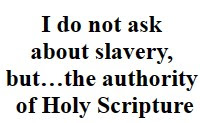[p. 6] The Assembly simply intends to say that since Christ and his inspired Apostles did not make the keeping of slaves a bar to communion, neither have we, as a court of Christ, any authority to do so; since they did not attempt to remove it from the church by legislation, neither have we any authority to legislate on the subject.’
Here, Sir, we have a position carefully won and thoroughly fortified with the Word of God, and yet in the face of this well-considered testimony we are required to believe slavery is an evil thing, a guilt, a sin, and the fruitful source of rebellion, bloodshed, and all manner of crime! Mr. Moderator, I cannot and will not believe so. I do not ask anything about slavery, but I ask about the authority of the Holy Scriptures, and according to the light I have now, the act of 1864 was against these Scriptures and aimed directly at unbelief. ‘The grass withereth, and the flower thereof falleth away: but the word of the Lord endureth [p. 7] forever,’ [1 Peter 1:24-25] unchanged and unchangeable in the midst of the most tumultuous struggles of the earth. To the divine authority of this Word we must all bow with unconditional submission, and since, according to the opinion of the advocates of the ‘Declaration and Testimony’, there was a direct conflict between the action of 1864 and the explanations of the Bible — indeed, between the hot and hasty action of 1864 and the calm and prudent judgment in 1845 — we consider that there was more than sufficient reason for a serious and vigorous protest, if we wished to save the Church from a still more serious apostasy from the faith. Why, therefore, should we [LuW p. 216] be accused of being the greatest sinners before the bar of this high court, since it is evident from the testimony cited that we could not accept both acts of the Assembly without being guilty of gross inconsistency and childish self-contradiction? Sir, tell us, which of those two acts were we bound to accept as loyal Presbyterians? The act of 1845 remains unchallenged and was in fact unchallenged until 1864, when it was quietly ignored without even the honor of being mentioned in the long written essay adopted by the Assembly.… [p. 14] Show us that we are in error, and with the greatest joy and willingness we will revoke our explanation and nullify our testimony, but injustice and unnecessary severity will not quiet the agitated elements that threaten the calm continuance of our Zion. We may fall, but others will take up our cause and carry it to victory, if not soon, certainly at the appearing of our Lord. We are waiting for our time and, standing unmoved in [p. 15] the consciousness of right, we are not here to ask for mercy, but to ask that you too may do what is right in view of the account we must all give so soon on the day of judgment.” —
[Walther concludes:] Let this be enough. Finally, we only declare that the Assembly has stuck to its decisions once made, unconcerned about the Word of God, its own constitution and its previous official explanations, and about the highest court, thus making the break of its fellowship inevitable. In place of fidelity to the Word of God, she has just substituted her party-patriotism, as well as the humanism and philanthropism of the age. W. [Walther]


No comments:
Post a Comment
Comments only accepted when directly related to the post.